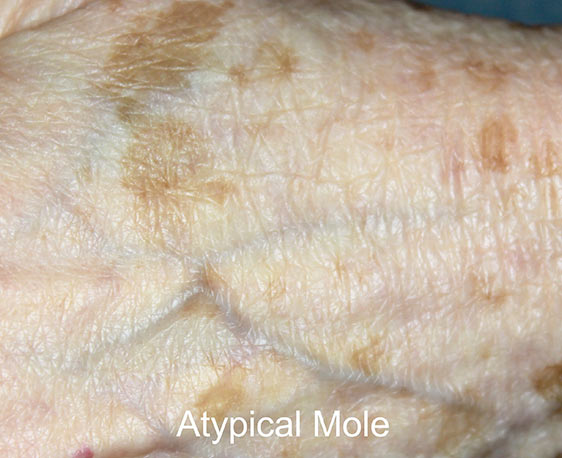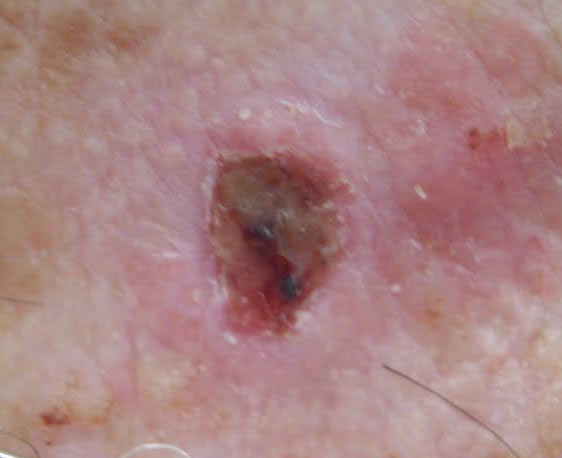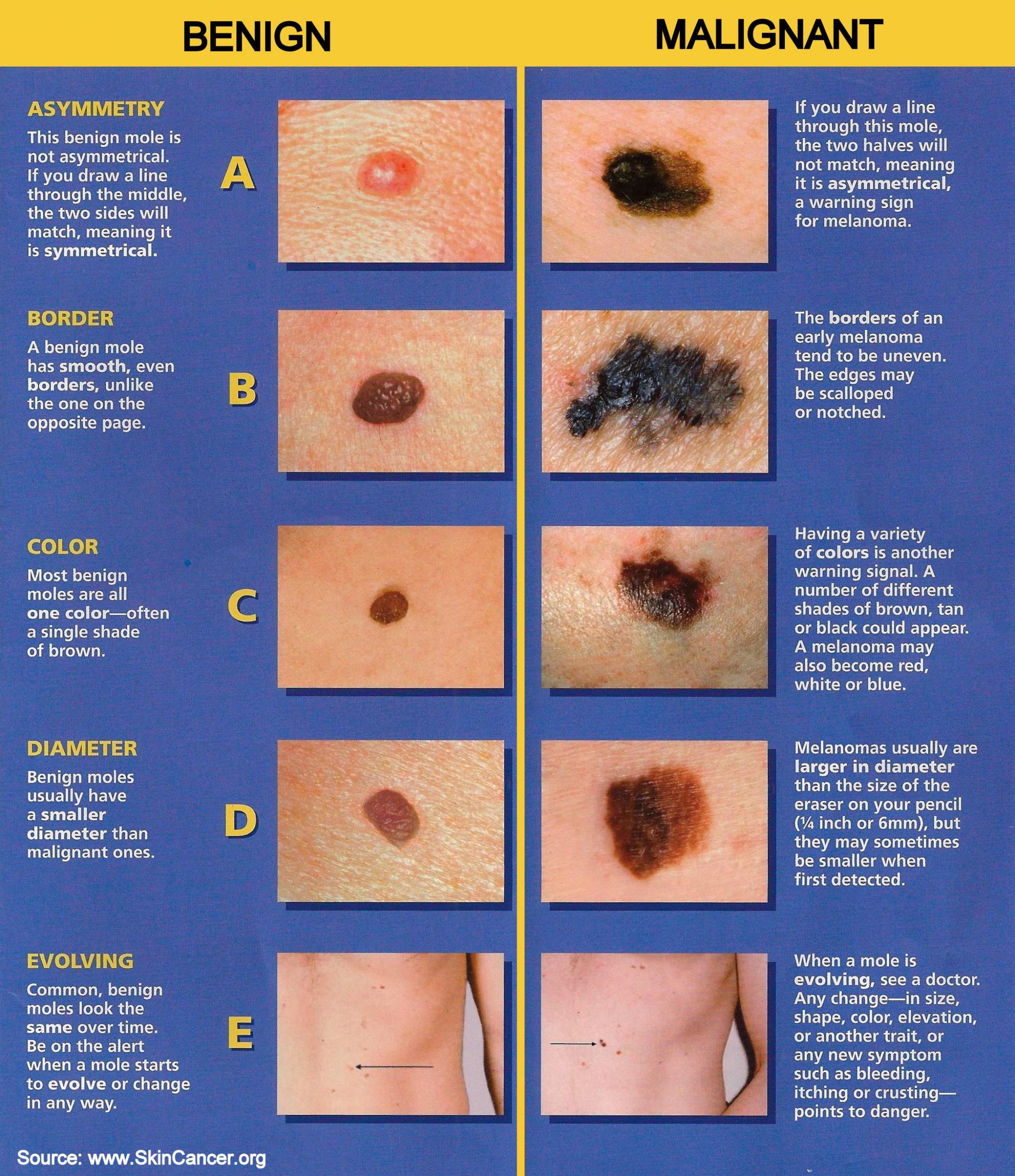Skin Cancer
Skin cancer is characterized by the unusual growth of skin cells. This happens as the DNA in the cells develop errors or mutations causing excess growth. In most cases, skin cancer develops as a result of overexposure to the ultraviolet rays of the sun without proper skin protection. However, in some cases, cancer can develop in areas that are not frequently exposed to the sun, which may mean that the cancer may have resulted from exposure to a toxic substance(s) or having a compromised or weakened immune system. The three most common forms of skin cancer are:
- Basal Cell Carcinoma – This may appear as a white, waxy looking bump and/or a flat skin/brown colored scar (see picture below).
- Squamous Cell Carcinoma – This may appear as hard, red bump and/or a crusted, scaly scar.
- Melanoma – This type of cancer is most often found on the legs in women and on the torso in men. This may appear as a large, brown, speckled spot; moles that are changing in size and/or bleed; skin lesions that have irregular borders and that are red, black, white, or blueish in color; and they may exhibit as dark spots across your body (hands, feet, mouth, vagina, or anus)
What are the risk factors associated with skin cancer?
Individuals will the following characteristics may be at a higher risk of developing skin cancer than others:
- Age – Skin cancer tends to develop slowly, which helps to explain why older individuals have a higher risk of developing skin cancer than younger people. However, this does not exclude younger people from developing skin cancer. Appropriate sun safety will significantly reduce the possibility of certain skin cancers.
- Actinic Keratoses – These are precancerous skin lesions that may develop into more severe forms of skin cancer. Please click here to learn more about spotting these types of lesions.
- Exposure to hazardous materials – Certain substance (i.e. arsenic) have been shown to lead to skin cancer. If you are ever required to handle hazardous materials, make sure you have appropriate protection to avoid exposure.
- Fat Cells – A recent study showed that liposuction in overweight mice helped to reduce the instance of skin cancer. Studies regarding this finding in humans are currently ongoing.
- Frequent history of sunburns – Ultraviolet (UV) radiation damages the skin leading to sun burns. The skin will try to correct the damage, but individuals who have received severe sunburns multiple times put themselves at greater risk of developing skin cancer.
- History of Skin Cancer – If you or a member of your family have previously developed skin cancer, this may put you at higher risk.
- Immuno-suppressed – If you have a weakened immune system, whether from sickness (HIV/AIDS, Leukemia) or from medication, you may be at a higher risk of developing skin cancer.
- Moles – If you develop moles and/or freckles easily you may be at higher risk of developing skin cancer. Click here to learn more about moles and skin cancer.
- Overexposure to UV rays – Spending excessive amounts of time in the sun and/or tanning (i.e. tanning beds/lamps) may make you significantly more likely to develop skin cancer. This is especially true for individuals who live at higher altitudes and/or sunny climates.


How can I tell if I have skin cancer?
 ArexAPP recommends the ABCDE rule for early skin cancer detection. The biggest key to remember with Skin Cancer or any other cancer is that early detection is often the greatest predictor in treatment possibility. The sooner the cancer is diagnosed, the higher probability of treatment success. Click the picture to the right to see a larger version of the ABCDE guidelines provided by the Skin Cancer Foundation. If you feel you might have skin cancer, call your dermatologist immediately to set up a skin check.
ArexAPP recommends the ABCDE rule for early skin cancer detection. The biggest key to remember with Skin Cancer or any other cancer is that early detection is often the greatest predictor in treatment possibility. The sooner the cancer is diagnosed, the higher probability of treatment success. Click the picture to the right to see a larger version of the ABCDE guidelines provided by the Skin Cancer Foundation. If you feel you might have skin cancer, call your dermatologist immediately to set up a skin check.
What are my treatment options?
The best treatment option for skin cancer is prevention. Avoiding exposure to ultraviolet (UV) radiation significantly reduces the risk of developing skin cancer. Additionally, frequent skin checks are advised in order to monitor moles and other potentially risky lesions on your skin.
For those who have developed skin cancer, treatment will vary depending on the type and extent to which the cancer has spread. The following treatment options are some of the most common for those with skin cancer:
- Freezing – Certain types of Actinic Keratosis and early-stage skin cancers can be treated through cryosurgery (freezing cancerous cells with liquid nitrogen).
- Lasers – For certain superficial cancers, a laser treatment helps to vaporize growths while reducing exposure to surrounding skin. This approach may lead to less downtime, smaller scars, and less swelling.
- Mohs Surgery – Physicians will generally use this approach for cancers that are larger and/or recurring and may be more difficult to treat. The Mohs Surgery is a process where the physician cuts out the cancerous lesions layer by layer and examines each slice under a microscope. This process continues until no cancerous tissue is evident under the microscope. The goal of this process is to remove cancerous cells without affecting surrounding healthy cells.
- Radiation and/or Chemotherapy – In cases where surgery is not an option radiation and/or chemotherapy may be the better approach. Systematic chemotherapy may be used when skin cancer is advanced to the point where it has spread to other organs in the body.
- Surgery – The doctor will excise the cancerous lesion and some surrounding healthy skin to reduce the probability of recurrence. In some instances, the physician will also use a curet (circular blade) to scrape off cancerous cells. This process may be followed by electrodesiccation, which is an electric needle used to destroy remaining cancerous cells.


Why choose the Texas Institute of Dermatology for your skin cancer treatments?
Our mission is to serve as a leading center for understanding and treating skin, hair, and nail diseases in South Texas through excellence in patient care, research, and education.
We want you to feel that you have been treated with the comfort, privacy, safety, and satisfaction that you deserve. This is why all of our procedures are performed or supervised by our renowned dermatologist, Dr. Reza Ghohestani.
His experience, combined with the latest technology and caring staff, is why the Institute is consistently ranked among the top dermatology centers in San Antonio and Boerne areas based on satisfaction surveys.
We currently serve communities throughout Bexar and Kendall counties, including San Antonio, Boerne, Leon Springs, Fair Oaks Rank, Canyon Lake City, etc. Many of our patients also come from San Marcos, New Braunfels, Kerrville, Austin, Wimberly, and Corpus Christi.
ley and Corpus Christi.

For an appointment, call 210-698-6777
Stone Oak Clinic: 238 North Loop 1604 E, Suite 208, San Antonio , TX 78232
Leon Springs CLinic: 24165 W IH-10, Suite 102, San Antonio, TX 78257
